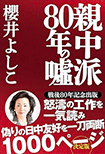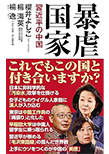The Voice of the People Neglected by Okinawa’s Two Major Dailies
After having long subscribed to two major Okinawan dailies 窶錀 the Ryukyu Shinpo and the Okinawa Times 窶錀 I must confess with a deep sense of despair that I no longer can regard them as legitimate newspapers.
I say this primarily because these dailies more often than not carry articles that are exactly identical. Take for instance the articles run in their May 27 editions regarding the 6th Pacific Islands Leaders Meeting (PALM 6) held May 26 in Nago City, Okinawa Prefecture. While the Ryukyu Shinpo ran a major article nearly occupying the whole of page 3 under the headlines “Japan Aims to Check China” and “Seeking Close Ties with First-Time Participant the US,” the Okinawa Times came up with an equally extensive article over two pages with the headlines “Japan Trying Desperately to Maintain Bond among Pacific Nations” and “China’s Rapid Advance into the Pacific.” However, the content in both papers was exactly the same. Presumably, these dailies simply decided to borrow a dispatch from the major Japanese news agency, Kyodo 窶錀 every word of it, although they obviously did make marginal efforts to produce headlines and split or join paragraphs in their own way.
Quite frankly, all I can say as a writer to my fellow journalists in Okinawa involved in these pages is: “Have you no shame?” I consider it the pride and joy of a journalist to do the legwork to get an article done satisfactorily. Likewise, the pride of an editorialist ought to be to write an editorial based solely on his insight and wisdom. And yet, both these major dailies apparently preferred to simply borrow a wire service dispatch. The intellectual laziness they demonstrated is appalling.
The intellectual shortcomings characterized by these two newspapers is marked by an inclination towards bias conspicuous in their day-to-day reporting. Putting it bluntly, these dailies show no trace of any sincere efforts to see things objectively or to provide readers an overview of any given phenomenon; from the reader’s standpoint, it is extremely painful to have to read an endless stream of articles and commentaries which are completely fixated on a baffling liberal ideology.
And yet I have continued to subscribe because I wish to read about, and understand, the reality of Okinawa. In pondering the over-all future of Japan, I am keenly reminded that it is mandatory to resolve the issues concerning Okinawa 窶錀 in terms of Japan’s national security and historical perspective pertaining to the island prefecture as well as in diplomacy towards China. Although there are a number of additional matters of importance involved in the so-called “Okinawan problem,” I must point out that each of them is twisted in ways that can appropriately be described as absurd. Unquestionably, one major contributing factor has been the biased reporting by these two major dailies.
The “voice of Okinawa” or the “good sense of Okinawa” as reported by these dailies do not necessarily correspond to the real thoughts and sentiments of the people of Okinawa. That is how I feel most strongly after covering Okinawa and giving occasional lectures on a volunteer basis over the years.
Anti-War Pacifism Forgives Almost Everything in Okinawan Journalism
On the contrary, a chasm appears to be helplessly widening between what the dailies report as facts about the Okinawans and their real sentiments. For example, the Ginowan mayoral election held last February 12 is a case in point. Yoichi Iha (60), former mayor of Ginowan who had led the struggles against US military bases, was an overwhelming favorite at the outset but lost to Atsushi Sakima (47) by a narrow margin. The winner was a newcomer to the Ginowan mayoral election. It was the second defeat in a decade for Iha, who quit as Ginowan mayor in the middle of his second term and unsuccessfully ran in the 2002 Okinawa gubernatorial election.
With Ginowan City hosting the US Marine Corps Futenma Air Station, a solution to the controversy surrounding the move of the base was expected to become more difficult should Iha win. The two dailies vigorously supported Iha, but a majority of the voters refused to vote for him on two occasions. As these election outcomes clearly demonstrate, the people of Okinawa do not necessarily oppose US bases or the Japanese Self Defense Forces under all circumstances, or constantly hold strong resentment against Japan proper.
I was quite pleased to find in the May 2012 edition of a small Okinawan literary magazine, the Urasoe Bungei, a special feature reflecting the voice of the people in Okinawa which corresponds with a distinct view of the Okinawans I have cultivated in my many years of coverage of the islands. This feature made me realize afresh that the real sentiments of the people do not match those depicted in the editorials and reporting of these dailies.
Slightly over 300 pages long and published once a year, the magazine transcribed a dialogue entitled “The Realities Facing the Okinawan Mentality” between Okinawa University sociology professor Yoshihiko Miyagi and poet Masahiko Hoshi, who also serves as a member of the magazine’s editorial board. In addition, there were five commentaries on current topics under a combined title of “Extortion and Rape.” Obviously, the title refers to remarks reportedly made by Kevin Maher, former US Consul-General in Okinawa, and Satoru Tanaka, former Okinawa Defense Bureau Director-General. (Maher was reported to have told a group of American university students in March 2011 that Okinawans had exploited the island’s military burden for financial gain; Tanaka was quoted last November as saying, “Would you say, ‘I will rape you,’ before you rape someone?” while explaining to reporters off the record why the Japanese government was delaying the release of an environmental assessment report on relocating the Futenma base.)
The five commentaries included sharply contrasting viewpoints regarding what the two men were supposed to have said. While one of the authors 窶錀 Hiroaki Fukuchi, Director-General of the Okinawa Human Rights Association and a central figure in the prefecture’s leftwing movements 窶錀 launched an all-out and highly emotional attack on Maher and Tanaka, social critic Takeshi Tsukayama, who sought the truth by meticulously researching the circumstances under which the words in question were reported to have been used. It is up to the reader to decide which of the two authors is more credible. However, in view of the laborious research conducted by Tsukayama, Fukuchi’s argument pales in comparison.
In his commentary, Tsukayama concludes that it is generally accepted today that Maher fell right into a trap set by a lawyer named Ms. Sase Saruta, “an activist who has been hotly involved in anti-US base struggles and other leftwing movements across Japan.” Ms Saruta serves as secretary-general of “Kenpo Angya-no-Kai,” an association dedicated to the preservation of Japan’s ‘peace’ constitution headed by Takako Doi, former head of the Japan Socialist Party.
In the secluded world of Okinawa’s journalism, in which virtually everything expressed in the name of anti-war pacifism is condoned, a commentary like Tsukayama’s could not have been developed without a strong sense of pride and conviction as a journalist. All of the journalists and editorial writers with the two major Okinawa dailies who simply follow the pack in writing biased articles and editorials without bothering to verify the truth should model themselves on a true journalist like Tsukayama.
The impact of the little literary magazine doesn’t stop here. Refreshing is an opening exchange between Miyagi and Hoshi in which they bluntly discuss the “narrow-mindedness” of “things traditionally Okinawan” as a factor detrimental to the island prefecture and its people, while analyzing the psychology of “amae” on the part of Okinawans, who tend to constantly expect the Japanese government to take care of them.
The Concept of “Amae”
Miyagi was a six grader in 1972 when Okinawa reverted to Japanese rule. He admits that his generation of Okinawans seriously faced this question: “What am I: Japanese, or Okinawan?” He also notes that, although today’s young Okinawans should no longer need to ask this question, they still strongly assert they “wish to say we are Okinawans rather than Japanese.” Miyagi analyzes such a mindset as a reflection of “amae” that Okinawans feel towards Japan, comfortable in the knowledge that Japan will forgive Okinawans 窶錀 who in actuality need not be skeptical about their being Japanese 窶錀 for wanting to make such an assertion. Okinawan intellectuals point out that there is a concept of “amae” deeply embedded in the base of many of the phenomenon pertaining to the people of Okinawa. Here’s how Miyagi and Hoshi view the characteristics of the two major dailies, which have significantly contributed to the formation of such public opinion in Okinawa:
Miyagi says that over the last decade he has begun to wonder if “newspapers in Okinawa are published solely for the purpose of running campaigns in support of various causes.” Following up on that thought, Hoshi has this to say: “Political campaigns waged by Okinawan newspapers have come to the point where they can almost move the nation by their own volition…There actually are some in the media who have gotten used to weilding such power and now come up with one scheme after another…They permit their own fabrications while condemning those by others.”
Hoshi points out that Okinawa’s contemporary thought has been formulated in a confining climate of dissent and describes its characteristics as “anti-nation, anti-establishment, with a sense of deep-rooted alienation towards Japan.” He is of the opinion that, with the two major dailies spearheading the campaign, Okinawan journalism has forged ahead with fierce character assaults against those who oppose this general atmosphere of dissent, fabricating stories and slandering them viciously. The serious lack of human resources in contemporary Okinawa’s academia and research, Miyagi and Hoshi argue poignantly, is because of this lack of open debate.
How encouraging it is that so small a magazine has so baldly and precisely elucidated the substance of Okinawa’s real problems! What a stunning contrast to the two big dailies. I will certainly continue to have high hopes for an Okinawa which embraces this little big magazine and such disciplined commentators. As for the two major dailies, I’m afraid I must resign myself to exercising more patience starting again tomorrow as I continue to follow their biased reporting.
(Translated from “Renaissance Japan” column no. 512 in the June 7, 2012 issue of The Weekly Shincho)















